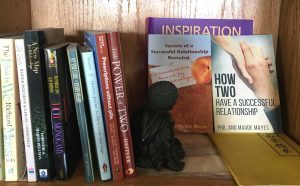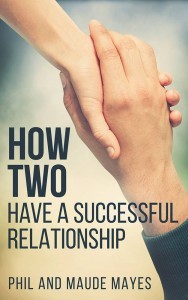Maude Mayes's Blog: Secrets of a Successful Relationship Revealed, page 83
November 19, 2017
How Do Commitment and Presence Affect Your Relationship?

Photo by Wilson Sánchez
When we sit down to write our blogs, we have two main principles we keep in mind. First is that we want to share our personal experience on how we live peacefully in our relationship. Second, is to convey how the reader can apply this information to their relationship.
As we were working on our theme of presence this morning, we seemed to be knocking up against each other a bit. Then we realized we were talking from our individual thoughts, and not coming from that mutuality between us. We were not actually looking at the topic in terms of our relationship, but rather from each of our separate experiences. Looking at those separate examples is fine and important to the discussion, but its better when we come from how it works within our relationship. In fact, as soon as we began to discuss it in those terms, the ideas flowed and we were present and creative together.
Don’t think of being present as some rare and unachievable state. It is sometimes described as a sudden illumination earned by years of personal work. “Then I felt drawn into a vortex of energy.” Eckhart Tolle. “The only thing I could say was it felt like I was home.” Ram Dass. There is no doubt such epiphanies occur. But being present is also a matter of degree, of which things you do and don’t give attention to.
It is a matter of how aware you are of your senses. Short of a fire starting, you can ignore them completely by thinking of the past or the future. But in a relationship, nobody wants to date a fire alarm; they want the experience of interacting with another human being. There is nothing else like it; not a video game, not a pet, not a 3-D movie. For that interaction, you have to be present, you have to be aware of their words, their gestures, their tone of voice.
When you stay alert & present with each other, there is no repetition; every time is new #presence
Click To Tweet
One of the immediate things that came out of our discussion this morning was how we are present with each other, that we are totally relaxed, feel free to communicate openly with each other at all times, and never fear reprisals, rejection, anger or withholding.
How do we achieve this state of presence with a total lack of fear? We believe one of the more important factors is our commitment to each other. Yet often in relationships, that very commitment creates almost the opposite results from our experience. Couples commit and begin to feel the relaxation and security that comes from knowing both people are fully in the relationship, and then slowly begin to accept that and take the relationship for granted. It’s like having a list and checking that box: “Okay, we are committed. Now on to the next thing that has to be taken care of!” Unfortunately, the very thing that lets you feel connected and present without fear can lead to complacency; you forget to nurture and foster, and to face things together from that place of unguarded security.
But when you stay alert and remain present with each other, there is no repetition; every time is new and different, and life is a continual sense of adventure.
We live in a constant state of honoring and celebrating our committed union. It is the source of our ability to share everything with each other without fear, without worry of lack of acceptance, or any need to guard or hide or suppress ourselves. As a result, we share in the present moment when we are with each other. We are not worrying about the past or preoccupied with the potential future. We are right in the moment with each other, getting the full pleasure of being together.
We invite you to move into this kind of presence with each other. Stay awake and appreciate the connection you both have. Foster it! Find your place of mutuality and live together in it.
November 15, 2017
Successful Relationships Reading Corner
 In this week’s blog, we suggested that you reframe your feelings and change your relationship. These articles cover the research, some excellent techniques, and a clear discussion of boundaries.
In this week’s blog, we suggested that you reframe your feelings and change your relationship. These articles cover the research, some excellent techniques, and a clear discussion of boundaries.
You’re Excited, Not Nervous. You Just Keep Telling Yourself That. “When you are nervous, people like to tell you to calm down, despite the fact that telling someone to calm down rarely, if ever, results in anyone actually calming down. Anyway, as Olga Khazan notes today in the Atlantic, the research shows that we are likely getting this backward — instead of attempting to tamp down your nerves, it may be better to keep them revved up.”
A Practical Guide To Reframing Your Thoughts And Making Yourself Happier “Our minds are constantly bombarded with negative thoughts, visions of horrible things that may happen to us, and terrifying reasons not to do the things we want to do. And yet in the end, these horrible things rarely happen. The thoughts cause pain by twisting yourself into thinking that things are not “kol beseder” (everything is ok, or s’all good, in Hebrew). The worst part is that these thoughts disturb us for so long and we never do anything about them! Well, that’s about to change.”
Why Healthy Relationships Always Have Boundaries & How to Set Boundaries in Yours “In romantic relationships we often think of boundaries as a bad thing or simply unnecessary. Isn’t our partner supposed to anticipate our wants and needs? Isn’t that part of being in love? Aren’t boundaries callous? Don’t they interfere with the romance and spontaneity of a relationship? Many of Ryan Howes’s clients assume that having boundaries means not having loving feelings toward their partner. But it’s actually the opposite.”
November 12, 2017
Reframe Your Feelings and Change Your Relationship
 A professor noticed that anxiety and excitement have several physiological markers in common, so she recruited people to sing karaoke, and quelled their anxiety by having them say “I am excited.” This did not change the anxiety, but it did change how the people were able to act. They were more productive, and could achieve their goal more easily just by repeating the sentence “I am excited” out loud before doing the activity they were anxious about.
A professor noticed that anxiety and excitement have several physiological markers in common, so she recruited people to sing karaoke, and quelled their anxiety by having them say “I am excited.” This did not change the anxiety, but it did change how the people were able to act. They were more productive, and could achieve their goal more easily just by repeating the sentence “I am excited” out loud before doing the activity they were anxious about.
This is like flying. From finding a bargain to security to small seats, flying has become an event to endure, but Phil still finds the takeoff to be an exhilarating experience: the nudge of the seat when full thrust is engaged; the moment when the nose lifts and a hundred tons of metal leaves the ground; the view of the city as houses become dollhouses, show off the swimming pools in their back yards and shrink further to pixels.
But for some people, it is a fearful event; you can see them grasping the arm rests and gritting their teeth, and Phil always thought that they were experiencing the same event as him and interpreting it differently.
Suppose a similar reframing could be applied to conflicts? They are about much more than the surface issue; You can probably recall the feeling, the location and the time arc of some arguments with ex-partners without any recollection of what the argument was about.
Arguments are about boundaries between people, and there are two sorts. One is where you feel your boundaries are being encroached on in some way: you can’t get any quiet time for yourself; you’re not getting your share of the storage space; you’re being taken advantage of financially; it’s always you that sweeps the floor.
The other boundary belongs to the other person, and they use it to hide from the world: you can’t be sure of what they’re really thinking; they use fashion as an identity; what you’re being shown feels like a hologram; they’re sometimes not available.
When you’re feeling distant or angry with your partner, try reframing your feelings #relationships
Click To Tweet
To talk about boundaries is to talk about identity. A circle is defined by its perimeter. A country is defined by its borders. Boundaries are how we categorize and make sense of the world, but they are often fuzzy. Clouds have no hard edge when flying through them. Does this movie count as film noir? What is the difference between trees and bushes? When does gossip become slander?
What about you? Are you defined solely by the boundaries of your skin or is that just your physical presence? Are your possessions part of you? Are you defined by your family, your job, your name, your country, your species, your gender, your sports team, your political leaning?
When there is a change in one of those things, it can affect you just as much as a physical wound, and yet our true self is not found there, so when something shifts, we have an opportunity to learn a little more about who we are.
In a similar way, a conflict that pushes on the boundaries in a relationship can teach us more about ourselves, and we can welcome that, rather than finding it threatening. Picking up on the opening idea (watch the video here), we can reinterpret our feelings of fear, anger or separation as excitement, find out more about ourselves, and in our relationship come from mutuality.
The next time you are feeling distance from your partner, anger at what they are saying or hurt and frustration towards them, try reframing your feelings and words. If you and your partner can agree to try this together, you will be well on your road to turning this into an opportunity for increased closeness. Our suggestion is to say out loud, “I’m excited to find mutual solutions.”
Try a new approach and have some fun with it. You may find that just by stating willingness and excitement, that you experience more ability to grow together instead of feeling apart!
November 8, 2017
Successful Relationships Reading Corner
 In this week’s blog, we wrote about the paradox of union and separateness in a relationship. Here are some excellent articles on this subject.
In this week’s blog, we wrote about the paradox of union and separateness in a relationship. Here are some excellent articles on this subject.
The Central Paradox of Love: Esther Perel on Reconciling the Closeness Needed for Intimacy with the Psychological Distance That Fuels Desire “How to live with those paradoxes, rather than succumbing to the self-defeating urge to treat them as problems to be solved, is what Belgian psychotherapist and writer Esther Perel explores in Mating in Captivity: Unlocking Erotic Intelligence (public library). Drawing on decades of her own work with couples and a vast body of psychological literature, Perel offers an illuminating and consolatory perspective on intimate relationships and our conflicting needs for security and freedom, warmth and wildness.”
How to Not Lose the “Me” When Becoming a “We” “The question is: how to be in a relationship and not lose yourself; how to be part of a We without losing Me. What makes being in a relationship tricky is that it provides the opportunity for two completely different experiences. On the one hand, it is an opportunity for two individuals to be supported by each other’s appreciation and love for the person their partner is. Both partners are enhanced by such an association, and flourish and grow as people.”
Relationship Success: Balancing Togetherness and Individuality “Maintaining individuality is critical to establishing a long-lasting, healthy partnership. Therefore, equal efforts between attending to oneself and making the relationship work are necessary. Personal boundaries are the limits we set for ourselves as individuals in relationships. They protect our sense of personal identity and help guard against being overwhelmed by the demands of others.”
November 5, 2017
The Paradox of Union and Separateness in a Relationship
 Phil: I want to write about how we create these blogs because it illuminates the way we are together.
Phil: I want to write about how we create these blogs because it illuminates the way we are together.
We usually talk about topics until one appears and feels fruitful, explore it some, then go off and write separately. When we come together again, we may amalgamate our different voices, interleave our different aspects, or take one as the framework and polish it, but whatever way we end up writing, one thing is certain: that we each agree with what the other has written, even though it may be in a different voice.
There is an explanation for this: that we are both writing about the same thing – and this is where it gets difficult, because it is a knowing, an experience, that is the source, and words are poor descriptors. So what can I call it? Think of a handshake and the shape of your hand. The other person’s hand forms a shape that is different but intimately connected to your own. It feels as if we come so close together because of full acceptance that we actually touch, not in the physical world like the handshake, but in some intangible world, and the boundary where we meet is shared and mutually recognizable. But that agreement that we always have is best described as a single source, as if we have merged into a – what? A shared agreement, a cosmic connection, a merged consciousness? No, none of those, because it is an experience of each other, and descriptions like those only capture a fragment of it.
By now you must be throwing up with the saccharine image I’ve presented. Well, yes and no. The “no” is that much of our days are spent out in the world, completely separate and independent of each other. The ability and freedom to be completely alone by ourselves allows us to have that saccharine “yes” of union when we are together.
I’m not saying that we demand each other’s attention at any time; it’s a much more organic flow, balanced by full acceptance, so there is no boundary between the states and we can flow seamlessly between them.
I wrote that last night and showed it to Maude over breakfast, who (of course) understood and offered a few minor edits, and also asked what you, our readers, would get from it.
The point of this is that I have come to realize that there is something in common between us that we both tap into that I find in our writing, living and sex. The word that works best for me is union. It’s a radical idea that ties into questions about identity and consciousness that I have been writing about elsewhere, and I won’t expand on here except to say that I can simultaneously be myself and part of the union.
So what I want you, dear reader, to take away from this is to look for, stay aware of, and feel connected to the union aspect of your relationship. It’s there, or you wouldn’t have a relationship at all.
Our mutuality is our strength. Out of this we can resolve any conflict #relationships #quote #love
Click To Tweet
Maude
“So what point is that?” you ask.
Well, in our mutual writing we live out a most important aspect of our overall union. We tend to write and describe things differently. We use different words and different styles to express our thoughts and feelings, yet we have no trouble coming together and joining our pieces into one cohesive blog.
The reason this causes no difficulty is our connectedness, our merged self if you will. We have experienced over and over that we have the same actual experience. The quality is the same. The meanings and values are the same. It is often difficult to put into words because this knowing comes from direct experience and is not a product of the mind. Yet it is a true unshakable knowing, something that is an integral part of our reality.
This bond of understanding allows us to live with total acceptance of one another. We honor and respect the separate individuality of the other without that impinging upon our union, our togetherness in any way. We often spend a great deal of our days apart, each doing our separate activities, and yet we do not feel separate or divided.
“Well, that’s great for you,” you may be saying. “But how does that help me in my relationship?”
Being able to always know that we are connected and so completely united is the place from which we can solve all issues and make all decisions. Our mutuality is our strength. We are so completely together, yet our total separate individuality is not assailed or attacked. The support that comes from this paradoxical way of being in the world is primary to our successful relationship.
This mutuality is the cornerstone of all the successful relationships we have encountered, no matter how differently people express it. It is out of this center of understanding that you can resolve any conflict, argument or misunderstanding. When you are feeling distance and the upset or distress that comes from feeling distance, remember your connection. Remember you are united. Return to that place of union, to the place where you are both on the same side, or better yet, where there is only one side. Then address what is making you feel that distance. Discuss this from your place of togetherness. Practice active listening and speak from the “I”. Remind yourselves of your connection by being in actual physical contact.
Practicing communication in union will enrich you every time you remember to do it. Feelings of distance from your partner can fade easily away, as they are usually illusory. The extraordinary experience of peace that comes from this way of acting together will make everything you do as an individual better and stronger. Thank you for joining us and helping spread peace, one relationship at a time!
November 1, 2017
Successful Relationships Reading Corner
 In this week’s blog, we wrote about honesty in your relationship, and we’ve found some great articles on this topic.
In this week’s blog, we wrote about honesty in your relationship, and we’ve found some great articles on this topic.
Love and honesty: what we hide and why we lie “I want to talk about honesty and dishonesty and how it comes into play in relationships…. This is about emotional honesty – the habits and ways of being that seem small, but actually create who you are and how you form bonds with others. Because the simple act of being honest can change your life in awesome earth-shattering ways. What I’m talking about is kind of like emotional lying – it’s subtler and therefore insidious in how it hurts your life – and it’s tied a struggle with acceptance. What I hope to offer is insight into why either you are “shielding” others from the truth or why others are doing this to you. I’d also like to sell you on the amazing and powerful benefits of being honest and letting go of control. Because that practice has amazing benefits in your life. Without further ado – three parts: what why and how!”
Do You Have an Honest Relationship? “For all the great things we say about being honest – that it’s the best policy or that the truth shall set us free – research tells us that we aren’t all that great at it. According to studies by Dr. Bella DePaulo, people lie in one in five of their interactions. These lies aren’t only to strangers or peripheral figures in our lives. Couples deceive each other all the time. DePaulo’s research showed that dating couples lie to each other about a third of the time, while married couples do so in about one in 10 interactions. While people seem to tell fewer of the “little” or “everyday” lies to loved ones, 64 percent of serious lies (“deep betrayals of trust”) involve people’s closest relationship partners.”
What Do We Mean By Honesty in a Relationship? “I have worked with many individuals who come into therapy because they are unhappy in their relationship. They share with me what makes them unhappy about their loved one, meaning what that person does or doesn’t bring to the relationship. When I ask the question, “Does your partner know how you feel?” the answer is almost always, “No.” There are many reasons they haven’t shared how they feel. Some don’t want to hurt their partner, while others worry about the reaction they will receive. Some express, “What’s the point? It won’t make a difference anyway.” However, sharing your true feelings is an important aspect of honesty in a relationship and deserves your attention.”
October 29, 2017
What is True Honesty in Your Relationship?

Phil loves reading advice columns and sharing whether or not he thinks they have offered insights. In a recent column, a woman described a situation where her husband had asked her a question casually in the course of another discussion. She avoided the issue. She wrote that although she didn’t know why, she didn’t want to discuss this with her husband and was asking if this was okay, or was it somehow being dishonest. The question was about honesty and whether full disclosure is necessary in a relationship.
We are both of the opinion that white lies are still lies. They’re usually made to save someone’s feelings, but they have the effect of destroying trust. If I can’t trust whether you like me in this hat, how can I trust what movie you want to watch, or where you would like to eat, or if you find them attractive, or why you didn’t pick up the phone? It is as if you are slightly out of focus; a little fuzz of uncertainty surrounds every detail. Don’t do it. If the truth will make me uncomfortable, then so be it. It may be my sensitivity or your pickiness or whatever, but it’s the truth for you at this moment. When you offer it, I should be honored to accept it.
Worse than white lies designed to protect my feelings are outright lies designed to conceal some part of yourself: you only had two beers; you did go to the store, but they were out of milk. Don’t do this. You know why.
Honesty illuminates and enriches your connection, leaving no barriers to intimacy #relationships #quote
Click To Tweet
However, we both agree that not everything has to be shared. Honesty does not mean that you have to spew forth the total contents of your mind. You’ve probably had the experience of feeling drowned in a fire-hose of opinion from someone whose speech center is wired directly to their mouth. Often, thoughts that come up are things you should be dealing with by yourself, at least at first, like your own private dream world or an idea that is not yet thought through.
The letter writer was in that stage of not being ready to share because she had feelings that were not sorted out yet. She wrote: “I’m neither ashamed of nor regretful about my decisions. I’m not sure why, but I just really don’t want my husband to know.”
The woman would have to first find out why she didn’t feel like sharing about this issue: was it something she needed to work on about herself, did it impinge upon the relationship in any way, was she actually withholding something from her husband, or did her reticence reflect distrust? These are the kinds of questions she would need to evaluate for herself before deciding whether or not being honest would require discussing this with her husband.
Honesty illuminates and enriches our connection. We want to make sure there are no barriers to intimacy and that we can completely relax and be open and undefended with each other. At the same time, even when deeply connected and in union, there are still areas where we exist as a totally separate and unique individual. To have a merged existence requires we also have a separate one. This is the central paradox of being a couple, and honesty is an essential part of how we can experience both. Being honest is something that starts with yourself, and from there, carries over into how you are with your partner.
October 25, 2017
Successful Relationships Reading Corner
 In this week’s blog, we asked how do differences in your relationship strengthen it? Here are some other articles covering aspects of that.
In this week’s blog, we asked how do differences in your relationship strengthen it? Here are some other articles covering aspects of that.
Relationship advice: five experts reveal the secrets to long-term love “One of the more ridiculous myths about “true love” is the idea of the soulmate – that there is someone out there who is your perfect match. A good relationship is about navigating the numerous differences between you – over politics, food, money, how to raise children. It’s those differences that make life more interesting, as our lover opens up a whole new way of seeing or understanding the world. Enjoy what others have to offer rather than trying to change them to fit your own template of how life and love should be.”
10 Ways Overcome Conflicts in Relationships and Grow Together “About six months into a serious relationship with my boyfriend, we started experiencing major conflict. Fighting over small things, flipping out over misunderstandings, we just couldn’t seem to get on the same page about anything. This caused me to think about relationship conflict in general, what causes it, and how to deal with it.”
Relationships and how to manage them well “Human relationships are infinitely complex and problems can manifest from many different sources. It can be helpful to take time to explore and unpick the mixture of these influences.”
October 22, 2017
How Do Differences in Your Relationship Strengthen It?
 To be in a successful relationship, it is very helpful to know and be comfortable with yourself.
To be in a successful relationship, it is very helpful to know and be comfortable with yourself.
We all try to fit in with each other, just as the birds in a flock act together. We make ourselves more attractive to other people by how we dress, speak, behave and react. It is ubiquitous, yet the influence of others on us is hard to notice. Coming to know yourself includes recognizing these influences and choosing which are appropriate.
The more you understand yourself, the easier it will be to experience an undefended state with each other because you will not put up a false front to make yourself acceptable. This leads to a full sharing of who you are, and an acceptance of the differences between you. These differences are inherently present with any two people as a result of the completely unique nature of each individual. They are an enrichment of who you are and can greatly add to your quality of life, but only when you do not feel assailed or attacked or afraid of the difference.
In your relationship, accepting the differences between you greatly adds to your quality of life
Click To Tweet
Many people, especially when young, enter into a relationship from a sense of incompleteness: some void they want filled, some fear they need assuaged. As we come to know ourselves better, we come to terms with these needs, and are quite happy with our lives as individuals, and yet we still desire an intimate partnership. When we reach out from this place, we generally seek something other than ourselves, something to add to us. If this were not the case, then we would just stay happily alone.
Even when we are not operating to fill a sense of incompleteness, there are still things we can receive within a relationship that are intrinsically impossible to get alone. There is the actual experience of a relationship, the sense of communion with another, even if it is our cat. The only way to have the experience of an orange is to have an orange; you cannot get that experience from a lemon. Some other elements we can only get from a relationship include shared sexuality, mutual support and synergy.
In the beginning of relationships, most of us are attracted to our sameness, our agreements and how well we are matched. It is important to remember that when your core values and connection are matched and strong, the differences between you become a source of strength and inspiration.
There are two kinds of differences. One is the fact of otherness, where each of you organizes the shelves differently, and the other is where you express your mutually held values in totally different words and often different actions. This is where the opportunity to be added to most strongly occurs.
The kind of vulnerability that is possible in an intimate relationship allows you to show yourself fully and to know you will be seen and acknowledged for who you are. To experience difference without separateness can be a wonderful strength that your relationship can offer you. The goal is not to agree on everything and be the same, but to create outcomes together that will add more to each of you while supporting your individual development.
In the first few years, of our relationship, Phil was always struck with what he called the quality of non-interference. He felt there was no attempt at controlling him or expecting him to be something other than who he was. He felt his individuality was respected. Maude was deeply struck by Phil’s openness and his willingness to share who he was, how he felt, and what he thought. In offering himself in this vulnerable, undefended manner. Phil created a strong bonding connection that allowed Maude to really experience another person who spoke and acted differently than she did, but who shared her values and meanings deeply. This led to an important enlargement of her world.
So develop yourself and respect each other’s individuality. You will both grow to be more than you were on your own, and life will get juicier and fuller as a result.
October 19, 2017
Five FREE Days of “How Two: Have a Successful Relationship”
 We are pleased to offer the ebook for “How Two: Have a Successful Relationship” for FREE today 10/19 through 10/23 midnight Pacific time.
We are pleased to offer the ebook for “How Two: Have a Successful Relationship” for FREE today 10/19 through 10/23 midnight Pacific time.
This is a wonderful opportunity for you to read the full details of Our Process as summarized in last week’s blog. You will experience the wonder of finding mutual solutions and making decisions without compromise, fighting, or estrangement.
10/19–10/23 FIVE FREE DAYS “How Two: Have a Successful Relationship”
https://www.amazon.com/dp/B01E98AF12
Do you and your partner argue too much?
Are you always fighting about who is right?
Are you feeling estranged and distant?
You can have a relationship without conflict — find out how.
Phil and Maude share a simple step by step process that is easily accessible to everyone. Read their personal experience of how it’s possible to have a loving passionate relationship without conflict and alienating arguments, one based on shared core values and a complete acceptance of each other’s individuality.
They have outlined an effective process for creating mutual solutions. Their strong desire to make their direct experience available to all couples shines through their writing and will renew your faith in what is possible and attainable. What is offered is a path to transforming your relationship.
In this book you will learn:
How to find mutual solutions to decision making and problem solving
How to remain an individual within the relationship
How to break the vicious cycle of anger and recrimination
How to avoid the pitfalls that create separation and estrangement
How to keep that original loving connection to your partner
This book is a gem. It’s short, it’s practical, it’s based on real life experience. If you want a great relationship, this is the book for you.
“Phil and Maude know what it takes to have a successful and fulfilling relationship. In their new book, ‘How Two: Have a Successful Relationship’, they use honest, real life examples that actually work for couples wanting to create harmony and deep satisfaction in their relationship. If you are looking to finally establish true acceptance, intimacy, and a lifelong connection in your relationship, their book is a great read.” Michael Fiore, Digital Romance
“Phil and Maude actually live in a conflict-free relationship. Now they’ve written a book that offers up their secrets to the rest of us. I laud and celebrate this generous gift to me and to couples all over the world.” William Weil, host of the Conscious Couples Conversations podcast
10/19–10/23 FIVE FREE DAYS “How Two: Have a Successful Relationship” https://www.amazon.com/dp/B01E98AF12 eBook
Secrets of a Successful Relationship Revealed
We use this blog to continue the exploration of the magic that can be found in a relationship, and the wider implications of peace for the world. ...more
- Maude Mayes's profile
- 8 followers



